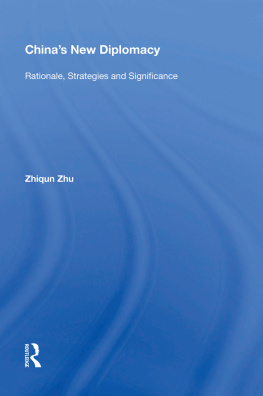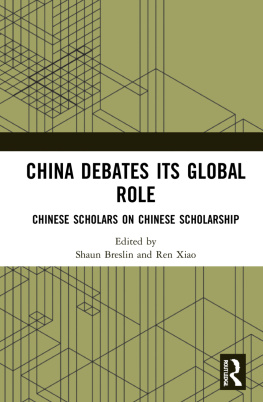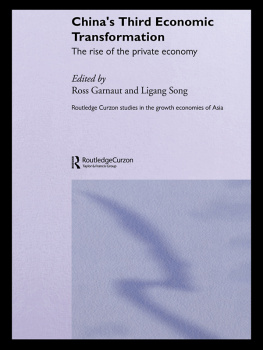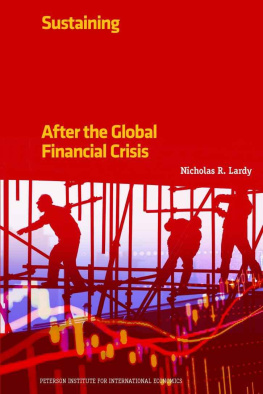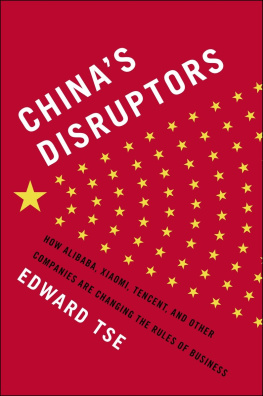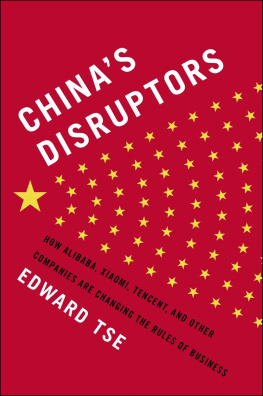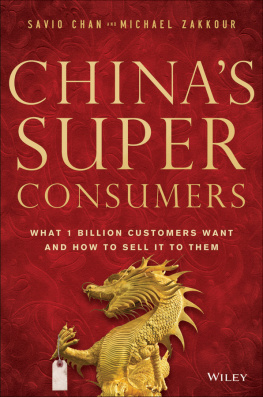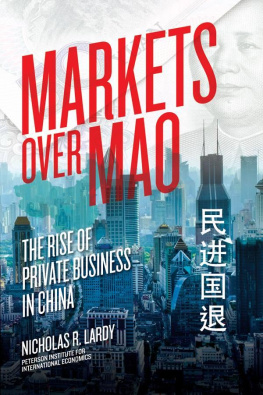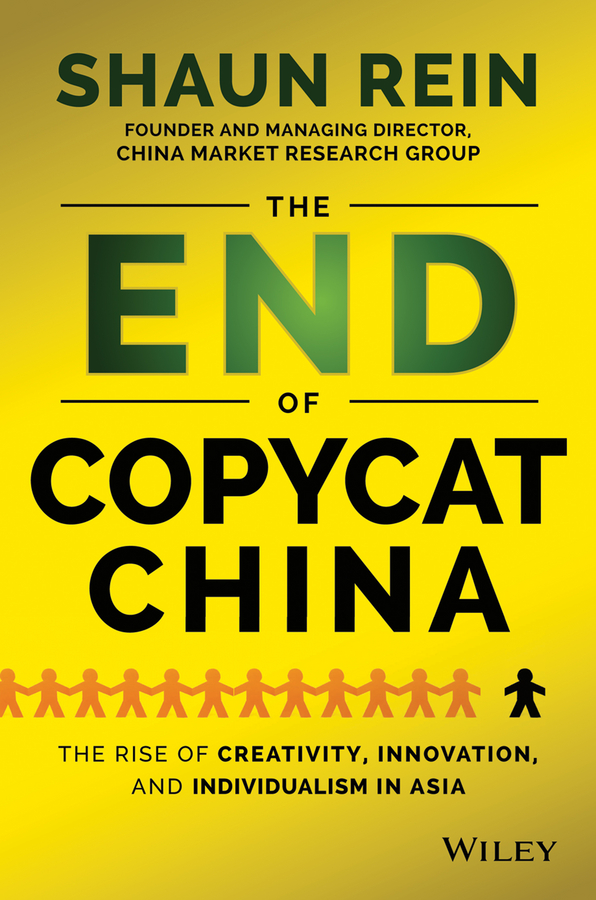
Cover image: Paper chain iStock.com/mattjeacock
Cover design: Wiley
Copyright 2014 by Shaun Rein. All rights reserved.
Published by John Wiley & Sons, Inc., Hoboken, New Jersey.
Published simultaneously in Canada.
No part of this publication may be reproduced, stored in a retrieval system, or transmitted in any form or by any means, electronic, mechanical, photocopying, recording, scanning, or otherwise, except as permitted under Section 107 or 108 of the 1976 United States Copyright Act, without either the prior written permission of the Publisher, or authorization through payment of the appropriate per-copy fee to the Copyright Clearance Center, 222 Rosewood Drive, Danvers, MA 01923, (978) 750-8400, fax (978) 646-8600, or on the web at www.copyright.com. Requests to the Publisher for permission should be addressed to the Permissions Department, John Wiley & Sons, Inc., 111 River Street, Hoboken, NJ 07030, (201) 748-6011, fax (201) 748-6008, or online at www.wiley.com/go/permissions.
Limit of Liability/Disclaimer of Warranty: While the publisher and author have used their best efforts in preparing this book, they make no representations or warranties with the respect to the accuracy or completeness of the contents of this book and specifically disclaim any implied warranties of merchantability or fitness for a particular purpose. No warranty may be created or extended by sales representatives or written sales materials. The advice and strategies contained herein may not be suitable for your situation. You should consult with a professional where appropriate. Neither the publisher nor the author shall be liable for damages arising herefrom.
For general information about our other products and services, please contact our Customer Care Department within the United States at (800) 762-2974, outside the United States at (317) 572-3993 or fax (317) 572-4002.
Wiley publishes in a variety of print and electronic formats and by print-on-demand. Some material included with standard print versions of this book may not be included in e-books or in print-on-demand. If this book refers to media such as a CD or DVD that is not included in the version you purchased, you may download this material at http://booksupport.wiley.com. For more information about Wiley products, visit www.wiley.com.
ISBN 978-1-118-92676-5 (cloth); ISBN 978-1-118-92674-1 (ebk);
ISBN 978-1-118-92672-7 (ebk)
Dedication
Tom Tom,
May life be the best journey ever.
Love, Ba Ba
Prologue

The stage lights beamed so brightly that I could barely see. I wiped the sweat beading on my brow and squinted to my left, where Dylan Ratigan, the host of his eponymous MSNBC show, sat readying to question me about China's changing economy and the release of my book The End of Cheap China: Economic and Cultural Trends That Will Disrupt the World.
On air, Ratigan hulks as a towering presencephysically imposing and unafraid to grill guests. In real life, Ratigan looms even larger, like an NFL linebacker. He rotated his head to gaze at me. The way he looked at me reminded me of a lion stalking prey.
I tried to hide my nerves. I had appeared on television many times before but never from 30 Rockefeller Center in Manhattan, where NBC records shows I had grown up watching, such as Saturday Night Live. I could not believe 18 hours earlier I had been home in Shanghai and now sat on the same stage many of the world's famous had sat. I saw Eliot Spitzer, the former New York governor caught frequenting $1,000-an-hour hookers, heading toward a green room to get his microphone. Was I really in 30 Rock, I wondered, or was I dreaming?
On air in 3, 2, 1, a stagehand yelled out, and I hurtled back to reality. The show aired a clip of Secretary of State Hillary Clinton musing about ChinaUnited States relations. She posed a question: What happens when an established power and a rising power meet? Would tensions between the two be inevitable as with Germany and the United Kingdom before World War I, or would the nations create a new paradigm for cooperation among superpowers?
Once I heard Clinton's sound bite, I knew Ratigan would grill me. After all, it was just months before the 2012 presidential elections, and anti-China hysteria was at its zenith. New York Times columnist Paul Krugman harped seemingly every day that China was a bad actor for manipulating its currency. The only issue Republican and Democratic candidates could agree on was conveniently to blame China for all of America's economic ills.
In the corner of my eye, I saw Ratigan flanked by his three regular guest hosts, former Republican candidate for Congress Krystal Ball, author and cultural critic Tour, and policy wonk Ari Melber, poised to pepper me with tough questions.
Ball did not mince words: How stable is the government, and how threatened are they by protests? At the time the 2012 Arab Spring, a wave of uprisings, was in full bloom, and Senator John McCain argued the Spring would come to China sooner or later.
McCain was simply wrong, I answered, pointing out the nonpartisan DC-based Pew Center found most Chinese supported the direction the central government was taking the country. Harvard professor Anthony Saich has also come to similar conclusions in his research. Mounting concerns about local government corruption and pollution needed to be addressed, I told Ballyet there was no chance of an Arab Springstyle mass movement any time soon.
Melber followed by asking if rising income inequality would cause social instability. Good questionthe gap between rich and poor had spread wider, and people who had not yet managed to buy a home were frustrated that property price growth outpaced wage increases.
China's economy had reached a dangerous point, the so-called middle-income trap, I answered. When per capita income hits $6,000, wage growth tends to stagnate. The rich get richer and the poor get poorer, causing social instability, which is what happened in Thailand and explains why the land of smiles had yet another military coup in 2014. Only a handful of countries, such as Japan, have overcome the trap after World War II. China must spread wealth more or run the risk of failing to develop a stable middle class, the backbone of healthy economies.
To combat stagnation, the Chinese government must enforce labor laws, raise minimum wages, and shift the economy more toward innovation, services, and consumption. More Chinese need access to health care, affordable housing, and a safety net similar to Social Security.
Ratigan pounced, asking whether it was fair to accuse China for screwing America with rigged trade and intellectual property infringement. At the time China's economy remained robust with 8 percent gross domestic product (GDP) growth, whereas the highest unemployment rates since the Great Depression savaged America.
As I parried Ratigan's and his cohosts' questions, I realized many Americans believe China's 30-year economic growth since its opening up in 1978 was predicated on copying intellectual property, rigging the currency rate, and stealing American jobs.
Few knew about China's moves up the manufacturing value chain, that the currency called the yuan had appreciated more than 25 percent against the U.S. dollar since 2005, or that China was now itself losing light industrial jobs to even cheaper countries, such as Sri Lanka, Indonesia, and Cambodia.
They did not realize Chinese consumers had started shunning Louis Vuitton (LV) knockoffs to become the second-largest global buyers of luxury items and the biggest-spending tourists to America and France per capita. They spent more per capita for the London 2012 Olympics than any other nation. In the meantime, China had become America's second-largest trading partner after Canada and accounted for nearly 30 percent more trade than the European Union.
Next page


